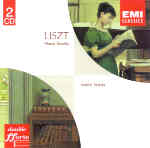The two Liszt recitals André Watts recorded for EMI in the 1980s have drifted in and out of EMI’s midline catalog and now reappear as a two-fer. If you can forego surface panache and accept on its own terms the pianist’s intelligently lyrical, somewhat careful approach to the six Paganini Etudes, these interpretations might grow on you. Among slower La Campanellas, though, Jorge Bolet uncovers more textural diversity and imparts more of a line to the concert etude Un Sospiro compared to Watts’ more heavily upholstered rendition. For my taste, Watts’ rhetorical nips and tucks throughout the Tenth Transcendental Etude prove less effective than intended: I prefer the more headlong and heroic Arrau and Richter performances. By contrast, Watts sweeps through Les Jeux d’eau à la Villa d’Este in alluringly shaded paragraphs. The Thirteenth Rhapsody comes alive with character in the fast section, as opposed to Watts’ dynamic inhibition in the opening pages.
All the late pieces (Valse Oubliée No. 1, Nuages Gris, Bagatelle sans tonalité, En Réve, and the strange, rarely heard Schlafos, Frage und Antwort) get terse, no-nonsense readings, while Au lac de Wallenstadt and Il Penseroso are suavely and rather blandly dispatched compared to Bolet’s more cogent shaping. Big-boned virtuosity and genuine dramatic involvement dominate Watts’ impressive Liszt Sonata, along with a degree of metric freedom (the notorious octaves in the opening section, and the hushed ascending scales prior to the fugue) that’s handled with the utmost in musicality and taste. Clearly this recording deserves a hearing for those inclined to supplement their reference Liszt Sonata versions by Arrau, Richter, and Argerich.
































